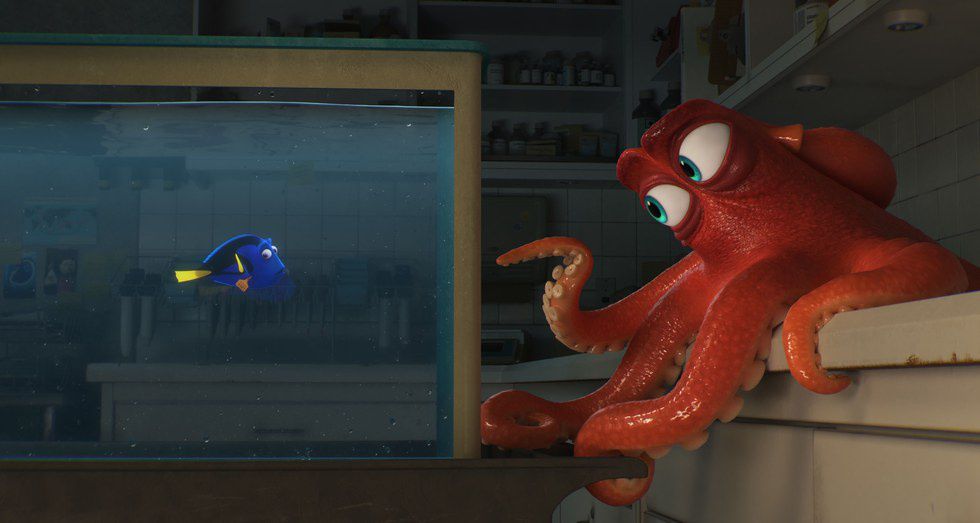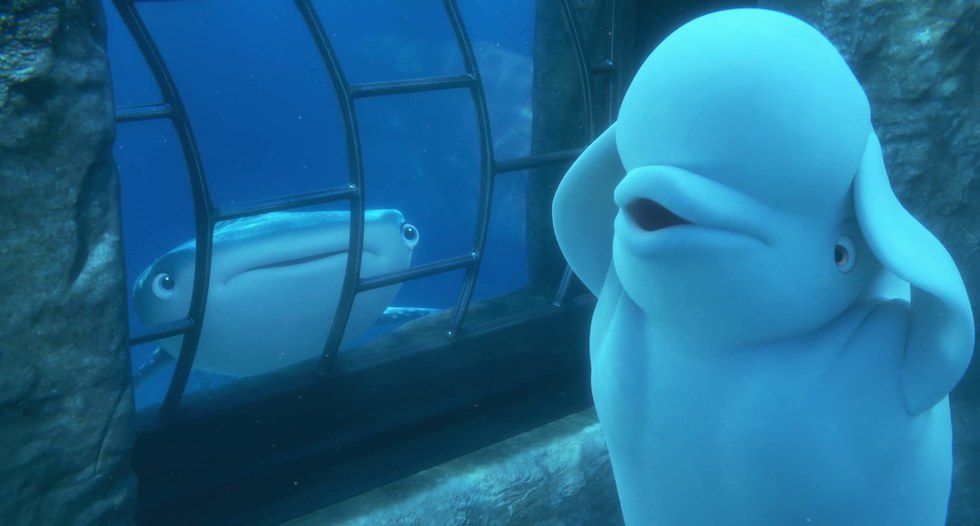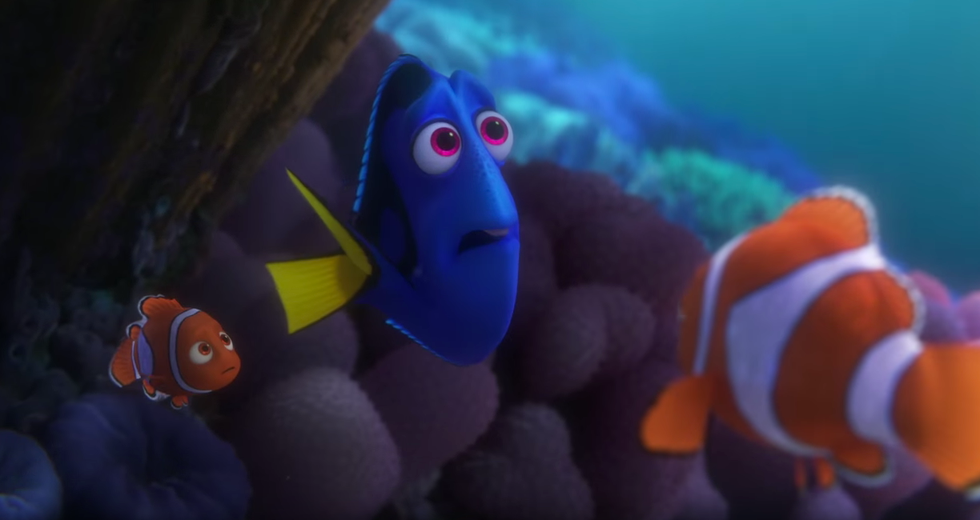★★★½☆ (7/10)
Having recently developed a franchise mentality after the enormous success of "Toy Story 3," Disney-Pixar continues its sequelization operation with "Finding Dory," which, like "Toy Story 3" before it, has drawn more attention and anticipation from millenials than today's generation of children. The big question, however, is whether the long-awaited sequel to "Finding Nemo" will swim among Pixar's classics or sink to the depths reached by weaker efforts like "Cars 2." From its opening minutes, it is clear that "Finding Dory" aspires to be one of the greats, and to be worth the thirteen-year wait by those who saw its predecessor when they were little guppies. Abound with humor and heart, but lacking the impact of Pixar's very best, "Finding Dory" is a bubbly follow-up that does just enough to justify the reunion of its colorful characters.
A year after
helping Marlin (Albert Brooks) find his son, Nemo (Hayden Rolence), Dory (Ellen
DeGeneres) has found a place to call home with her newfound family. Her
short-term memory has not improved in the slightest, that is until one day when
a lesson on migration, taught by Mr. Ray (Bob Peterson), triggers a memory of
her parents, Jenny (Diane Keaton) and Charlie (Eugene Levy). Bent on finding
her loved ones, Dory recruits Marlin and Nemo to help her follow a clue from
her triggered memory, which brings them to the Monterey Marine Life Institute
in California. After a brief run-in with a hungry squid, Dory is scooped up by
employees from the facility, prompting Marlin and Nemo to go after her. Trapped
in the facility, Dory meets grumpy septopus Hank (Ed O'Neill), short-sighted
whale shark Destiny (Kaitlin Olson) and beluga whale Bailey (Ty Burrell).
As a Pixar
sequel where the comic relief sidekick from the first film gets the spotlight,
"Finding Dory" is a vast improvement over "Cars 2" and
"Monsters University," giving the forgetful blue tang a solid arc
that adds a surprising amount of dimension to her character. This is probably
the closest Pixar has gotten to something of a character
study, which allows director Andrew Stanton the opportunity to
develop a captivating origin story for Dory that continuously reveals
itself as clues to her past trigger her earliest memories. There are plenty of
moments where Dory's intensively in-the-moment personality provokes the
belly-laughs we expect to have while watching her, but the real joy of
"Finding Dory" comes from discovering how her sudden desire to
remember everything she can about her past and her long lost family affects the
film's laugh-a-minute gags as well as Dory's own personal growth. It
is the most perfectly logical way to continue her story, and DeGeneres is
clearly overjoyed at the prospect lending her infectiously enthusiastic voice
to the character once again. She is no longer just the voice of Dory,
she
is Dory.
While Dory
certainly earns her promotion from secondary to primary protagonist, there
seems to be a missing component; a feeling that was so deeply shared by all who
saw "Finding Nemo" for the first time over a decade ago.
"Finding Dory" is definitely worth the wait, but it won't inspire
the number of repeated viewings earned by the original. Its message
to those with disabilities, highlighted by Dory's amnesia, Destiny's
short-sightedness, Bailey's echolocation deficiency, and Hank's missing
tentacle, is delightful, but it does not resonate as well as the parent-child
themes of "Finding Nemo." Whether or not it will go on to become a
classic like its predecessor is up for debate, but it's hard to imagine anyone
who would pick this over the first film.
In terms of
animation, Pixar provides us with tricks and treats recycled from previous
efforts, though most of them are still quite dazzling. Much of the runtime is
devoted to the characters' time at the marine life institute, resulting in a
lack of the oceanic wonderment that is ever-present the original. Hank's
ability to camouflage is simply an echo of Randall's from "Monsters,
Inc." There's also a scene involved a kid's touch pool that seems a bit
much like a repeat of the Caterpillar Room playtime scene from
"Toy Story 3." On top of all that, the plot is structured much like
that of "Finding Nemo," but that's easy to forget once Dory's
journey reaches its climax...or should I say, climaxes.
"Finding Dory" has a difficult time deciding when it should end. There are about five endings here, each one more preposterous than the last. The final chase sequence isn't on a "Cars 2" level of ridiculous, but it smells an awful lot like something out of a Dreamworks animated film, undercutting the emotional impact of nearly everything before it. Luckily, DeGeneres' invaluable comedic timing make it tolerable enough for disenchanted viewers to forgive it for its lunacy.
Cynical viewers can gripe all they want about Disney's attempt to cash in on the popularity of one character, but Dory's return to the screen may actually be exactly what we need right about now. With recent events affecting present and future lives in unfathomable ways, it's refreshing to witness a character who is so caught up in the now, unburdened by the happenings of the past, and able to appreciate life for what it is rather than what it was. In that respect, "Finding Dory" transcends its status as just another sequel and is totally worth paying the full price of admission just for one unforgettable fish.

























